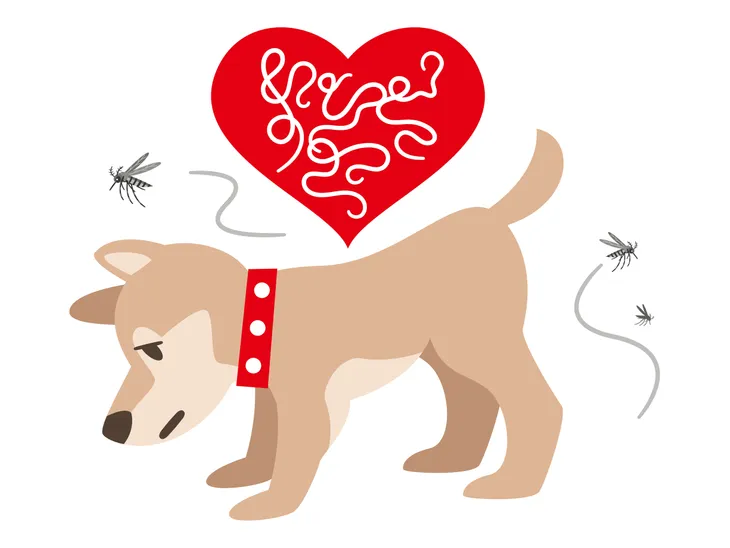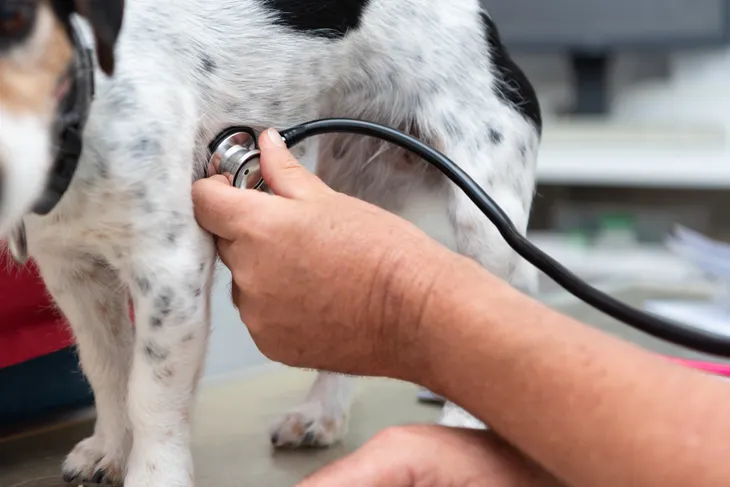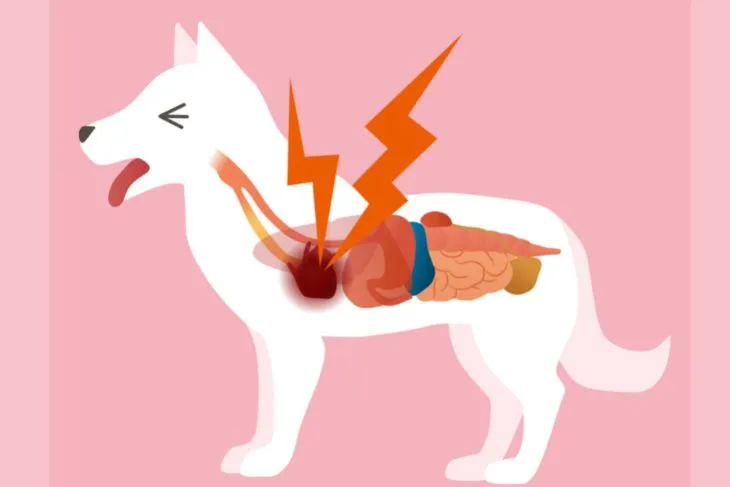Our pets are part of our family, so when they fall ill, it’s a devastating loss. According to Cardiac Care for Pets (CVCA), nearly 8 million dogs suffer from heart disease. That is 10-percent of the dogs in the United States. The source also notes that a dog’s risk for heart disease increases with age. Up to 75-percent of senior dogs have some kind of heart condition.
Some heart conditions are treatable, but no matter what the heart condition is, the most important thing is early detection and treatment. To better protect your pet, get informed on everything there is to know about heart disease in dogs, including the signs, causes, and treatment options…
Types of Heart Disease
Valvular Disease
The most common type of valvular disease in dogs are mitral valve issues. The mitral valve is located between the heart’s left atrium and left ventricle, explains VCA Animal Hospitals. It’s essentially a flap of tissue that acts as a door between chambers of the heart. They prevent blood from flowing backward through the heart. If they aren’t working properly, then the blood doesn’t flow as it should through the body.
According to VCA Animal Hospitals, 80-percent of heart disease is a result of mitral valve insufficiency. It’s more common in small dogs than large breeds. It’s usually detected by a heart murmur which is “produced by the turbulence created when some of the blood goes backward through the leaking mitral valve into the left atrium,” writes the source.
Dilated Cardiomyopathy (DCM)
The most common heart muscle disease in dogs is DCM, also known as dilated cardiomyopathy. CVCA reports it as one of the most common forms of heart conditions in dogs. It can go undetected for a long period of time.
“With DCM the muscles degenerate and begin to wear thin,” writes CVCA. “That thinning decreases the heart’s ability to contract and pump blood, and leads to congestive heart failure.” Unfortunately, this condition is irreversible but it can be managed through medication. In July 2018, the FDA announced they were investigating reports of DCM in dogs who were eating a “grain-free” diet. Talk to your veterinarian about this research and whether or not your dog should be on a more inclusive diet.
Arrhythmogenic Right Ventricular Cardiomyopathy (ARVC)
This heart condition is a disease of the heart muscle. It primarily affects Boxers, so much so that it’s also referred to as Boxer cardiomyopathy. There have also been reports in the English Bulldog, American Staffordshire, and on the rare occasion cats. “It is characterized by the progressive replacement of normal heart muscle cells by fat and/or fibrous tissue,” explains CVCA.
ARVC can be difficult to diagnose and is based on a combination of factors including family history, fainting or exercise intolerance, an abnormal heart rhythm or heart murmur that is noted during a routine wellness check.
Heartworm Disease and Myocarditis
If you’re a dog owner, you’ve likely heart of heartworm. Most dogs are on preventative medication for this disease during the warmer months. Heartworms are passed through mosquitoes. When a mosquito bites a dog, the heartworm larvae enter’s the dog’s bloodstream, says the Spruce Pets. In the body they will grow and develop into worms that eventually fill the lungs and heart of a dog (if they are not preventative heartworm medication).
In the case of myocarditis, the heart has “become inflamed and muscle cells are dying off,” explains the source. PetMD notes it is often caused by infectious agents such as bacterial, viral, rickettsial, fungal or protozoal agents that directly affect the heart or reach the heart through other body parts.
Congenital Abnormalities
Congenital abnormalities are when a dog is born with an abnormality or defect in their heart. They are born with a heart that doesn’t work properly. According to the Spruce Pets, some examples of congenital heart disease in dogs include patent ductus arteriousus (shunt), pulmonic stenosis, aortic stenosis, persistent right aortic arch, and ventricular septal defect.
The biggest marker for congenital heart disease in puppies is a heart murmur. Veterinary Practice News says almost every dog with this condition will have a murmur.
Congestive Heart Failure (CHF)
Congestive heart failure is not a type of heart disease, but rather the result of heart disease. It occurs when fluid builds up (congests) as a result of the heart’s inability to efficiently pump blood throughout the body. “A damaged heart may struggle to pump blood, which can cause blood to back up in the lungs that can lead to fluid accumulating in the chest, abdomen, or both, depending on the type of CHF,” writes PetMD.
It can occur on either the right or left side, just as it does in people. The right side of the heart is responsible for receiving oxygen-poor blood from the body and transporting it back to the lungs to get oxygen. The left side of the heart pumps oxygen-rich blood back out into the body to nourish the tissues, explains PetMD. Left-sided CHF is the more common type to occur in dogs. In this case, the blood backs up into the lungs and causes the lungs to swell. Dogs with left-sided CHF will have a cough and difficulty breathing. In the case of right-sided CHF, the main circulatory system becomes backed up and fluid gathers in the abdomen and limbs.
Symptoms of Heart Disease
Since heart disease can either be congenital (present at birth) or acquired (condition developed over time), dogs of all ages can have heart disease, says CVCA. Pets often won’t show symptoms of heart disease right away.
However, there are some key signs that could indicate a dog might have heart disease. The following are potential signs of heart disease: coughing and difficulty breathing, getting fatigued on walks or when playing, weakness (collapse), bloating or swelling of the abdomen, and sudden onset back leg weakness or paralysis.
Causes of Heart Disease
For the most part, heart disease is rare in dogs under the age of 5 and then increases with age. However, this isn’t a hard set rule because it can happen earlier or later in life, says Sonya Gordon, DVM, DVSc, DACVIM (Cardiology), a professor of cardiology at the College of Veterinary Medicine and Biomedical Sciences at Texas A&M University to Daily Paws.
When it comes to specific breeds and heart disease, Gordon warns that some purebred dogs have higher risks for specific heart diseases, but in general all older dogs are at risk for developing heart disease.
Diagnosing Heart Disease in Dogs
Heart disease often goes unnoticed by owners because the signs, particularly early warning signs, are so subtle. A veterinarian is likely the one who will catch heart disease in its early stages. If they suspect heart disease, your dog will undergo a full physical examination. According to the Spruce Pets, they will also take your dog’s breed, history, and symptoms into consideration.
To start, they’ll use a stethoscope to listen to the dog’s heart. They’re looking for a heart murmur or any kind of abnormal rhythm. If they suspect heart disease, the next step will be get a chest X-ray, do blood tests (including heartworm test), and possibly an echocardiogram (ECG).
Treatment for Heart Disease
In some cases, there are treatment options for a dog with heart disease. The first thing to do is to talk with your veterinarian about the next steps. “The main treatment options include daily medication or in some cases multiple medications. For dogs with the most common cause of heart disease, in the preclinical stage, once the heart reaches a certain size, starting a medication called pimobendan can prolong the symptom-free stage and overall survival,” says Gordon to Daily Paws.
If the dog develops heart failure, there are additional medications. However, not all dogs with heart disease will go into heart failure. To ensure your pet has the best chance at survival, early diagnosis is key. If caught early, it could be many years before heart failure develops, and in some cases it might never at all, says Gordon.
Prognosis for Dogs with Heart Disease
A pet owner’s first thought is likely, “how long do they have?” The truth is, it depends on the type of heart disease and the severity. If your dog has heartworms, they can be treated, but sometimes they pass away before the treatment is successful.
Tumors, particularly cancerous tumors, are life-threatening. They “carry a guarded prognosis based on the severity and spread of growth,” writes the Spruce Pets. While it’s definitely serious and needs to be carefully monitored by a vet, most dogs are able to live for many months and even years with heart disease as long as it is managed with medication.
How to Prevent Heart Disease
Unfortunately, there isn’t much an owner can do to prevent heart disease in their dog, particularly if the condition is congenital. However there are types of heart disease that are fully preventable, such as heartworm disease. Pet owners who live in areas where winters are mild and can appear throughout the winter, their dog should be on heartworm prevention medicine all-year round to prevent any transmission from mosquitoes, warns the Spruce Pets.
You should also make a point to feed your dog a nutritious diet, offer daily exercise, and help them maintain a healthy weight. While isn’t guaranteed to be 100-percent effective, it can help reduce their risk of developing heart disease. “If you are concerned about specific nutritional deficiencies that are known to contribute to heart disease, such as carnitine and taurine, discuss with your vet which diet may be best for your dog,” writes the source.
Also, the Spruce Pets advises owners to be wary of medications with known side effects on the heart. Do not use them unless they are necessary and avoid exposure to toxins and contaminated areas.















